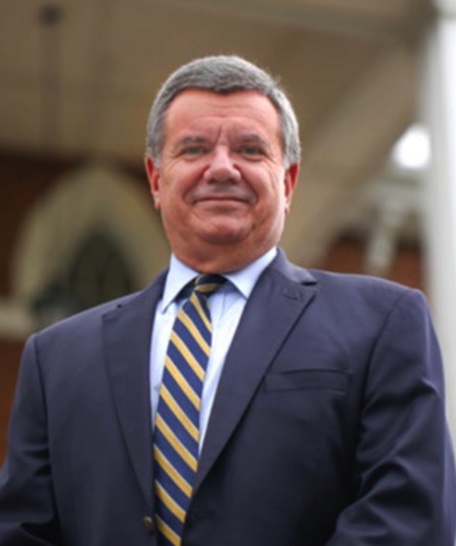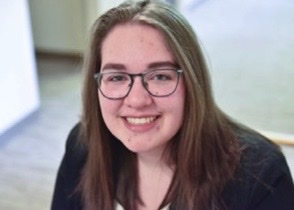Global Studies Symposium Reveals Challenges of European Politics
By Charlotte Walton
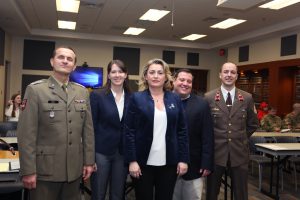
The “Micro and Macro Aspects of European Security: Global Studies Symposium” was excellent in showcasing the modern realities facing countries all over the world. Speakers from Hungary and Poland joined the faculty of the Department of Political Science & International Affairs. The event was held on January 24 in the David Potter Special Collections room in Dahlonega’s Library Technology Center.
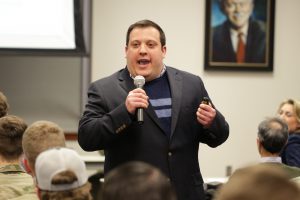
Dr. Nathan Price, Assistant Professor on the Blue Ridge campus, who is currently working on a paper on Brexit, is evaluating whether this will result in a “hard” or “soft” exit. He evaluated the perceived democratic deficit in the European Union, and evaluated the effect of repeat referendums on the legal system in the European Union. He evaluated Denmark and Ireland as his sample states, and explained that these states’ citizens voted differently in referendums, but not because their opinions changed. They voted differently because they believed that their vote would not matter, and if they voted the same as before the government would only call for another referendum. This phenomenon was not repeated after there was a vote for Brexit and the previous prime minister, David Cameron, decided to accept the vote in the name of true democracy. Four million people called for a revote, and once the recall was denied the Conservative party was divided. There are not yet simple answers for the complex issues that Brexit poses, but Dr. Price expects that the people’s will prevail.
Dr. Megan Hauser, Lecturer on the Dahlonega campus, presented her research on boycotted elections in post-Soviet states. She found that the most important measures of the states’ elections were their degree of competitiveness and the level of incumbent dominance. She examined 88 elections in post-Soviet states. Among the reasons for boycotts in post-Soviet states, Dr. Hauser said, is that individuals who boycott tend not to vote in elections because they either seek to discredit the operating regime or achieve some longer term goal of the non-voting populace. Dr. Hauser found that election boycotts tend to occur in countries with lower GDP and in areas where opposition actors expect a level of manipulation and fraud in their elections.
First Lieutenant Taksas Balazs of the National University of Public Service in Budapest, Hungary spoke of the contemporary challenges when supporting military powers in a nation. He explained that there must exist the technology, supply security, and economic support in order to be able to support a thriving defense industry. Dr. Balazs explained that nations must analyze their commodity chains , and be able to provide for all levels of production if need be. This independence is hard to attain, however, due to political, geographical, and sometimes direct market risks. Dr. Balazs emphasized the importance of nations understanding the possession of the entire value chain.
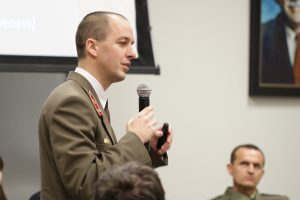
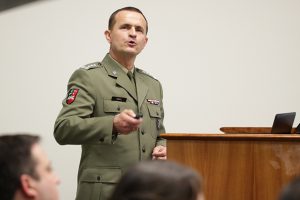
Colonel Tomasz Smal, dean of the Department of Management at the Military University of Land Forces in Wroclaw, Poland explained the logistical challenges that nations face during military operations and how these challenges are to be solved. Dr. Smal noted that the success of the current battlespace is dependent of the efficiency of logistics. He observed that future skirmishes will be on a smaller scale than known in the past and will focus largely on improving intelligence. Dr. Smal offered several logistical considerations when dealing with warfare, such as transportation, technology, and the repair and obtainment of lost resources. Dr. Smal showcased the calculator that his forces use to identify whether a resource is recoverable or not, and explained Poland’s view on standard and expedient repair.
Foreign and home based thought on European security was thoroughly fleshed out at the Symposium. This event was sponsored by the Department of Political Science and International Affairs and the Georgia National Guard.

